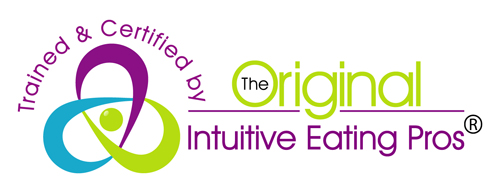
I have been teaching from a non-diet, weight-inclusive point of view for a long time, but discovered through learning more about intuitive eating and becoming certified as an Intuitive Eating Counselor that I’m not the only health care practitioner who teaches from this same point of view. Not only are there many dietitians and therapists who are trained and certified to teach from this point of view, but it is also strongly supported by scientific research. As of 2021 there are more than 125 studies that support intuitive eating and its positive health benefits. Read on to hear more about what it means to be an intuitive eater.
What is Intuitive Eating?
Intuitive Eating has been around a long time. If the term is new to you, Intuitive Eating was created by two dietitians, Evelyn Tribole and Elyse Resch way back in 1995, so it’s not actually a new concept, but one that has sort of caught on lately. The authors define intuitive eating as “an approach that teaches you how to create a healthy relationship with your food, mind, and body – where you ultimately become the expert of your own body.” It is a weight-neutral, evidence-based model (meaning there is scientific evidence, not just opinion, to support it) with a validated assessment scale. It is a non-diet approach that emphasizes internal cues and listening and paying attention to our bodies over external diet rules.
How is Intuitive Eating Different?
The non-diet part of Intuitive Eating refers to taking the focus off of the scale and other rules and restrictions and putting it on health promoting behaviors, improving body image, and finding peace and enjoyment with food. It is a process or framework that teaches a different approach to eating and our bodies than the typical diet culture, weight-centered approach that many of us turn to over and over without success.
To help differentiate, here is a comparison of the diet culture, weight-centered approach (emphasis on weight and weight loss when defining health and well-being) to an intuitive eating, weight-inclusive approach (emphasis on viewing health and wellbeing as multifaceted with the attention on positive behavior changes as opposed to a BMI or weight goal).
Diet Culture, Weight Centered Approach
In the diet culture, weight-centered approach eating is viewed as a moral statement with many labels on foods such as “good” and “bad”. Certain foods choices and ways of eating are demonized while others are praised and deemed right and acceptable. Thinness is viewed as the only acceptable body type regardless of genetics and weight loss is promoted at all cost.
Intuitive Eating, Weight Inclusive Approach
In contrast, with intuitive eating and weight-inclusivity the focus is shifted to honoring health, not just our physical health, but also our emotional and mental health. Food and our choices are not viewed from an ethical, right or wrong, perspective, but instead are based on choice, preference, and enjoyment. With this shift choices are guided by internal awareness, non-diet nutrition knowledge, and movement for wellness, not based on counting calories or points, diet rules and restrictions, and guilt. All body types are viewed as not only acceptable but respected and treated with compassion and care.
We are all born intuitive eaters. As babies and kids we have the innate ability to listen to our body’s cues and eat what our bodies need. When a baby is hungry they will let you know and when they are full they have the instinctual ability to stop eating. Over time though many factors such as family upbringing, genetics, environment, and exposure to diet culture beliefs and rules can confuse or disrupt our ability to trust ourselves. We get so discombobulated that we get to a point where we don’t think we can function without someone else telling us what, when, and how often to eat.
We are all so used to turning to the next book or new plan or fad diet to find health, but with Intuitive Eating YOU are the expert of your health and your body, as you should be. Of course there is room for learning and gaining new information and ways to care for yourself in regards to nutrition, movement, stress reduction, sleep, etc. but ultimately YOU are the expert of you, not some random unqualified book author or the next fad diet peddler.
The beauty of intuitive eating is that there is no pass or fail or good or bad. Those ideas and notions only make eating and food stressful and set us up to feel like a failure. How often do you start a diet, eat the “wrong” thing, feel like you’ve failed and go off the diet?
I was talking with a new client the other day who had this exact experience. She had started Whole30 and stayed with it for two weeks and then had a wedding to go to and didn’t want to miss out on all the yummy food so went off her diet and didn’t start it back after that weekend. When I asked her why she didn’t restart after the wedding she said with Whole30 once you go off you have to start all over again and she just didn’t feel like dealing with it. So, basically your punishment with that particular plan is…well you screwed up, despite all your hard work, go back to the beginning! So annoying!
I’ve talked to countless clients and friends who have experienced this exact same scenario and instead of directing their frustration at the diets and diet industry, where it belongs, they blame themselves. With intuitive eating you learn to let go of the regret, guilt, and shame associated with eating and start to listen to your body’s innate cues for hunger, fullness, satisfaction, and pleasure to better meet your physical and psychological needs. It really is a whole different way of approaching food and taking care of our bodies and minds. It is a process, but is well worth the time and effort.
The Benefits of Intuitive Eating
The positive benefits of intuitive eating are seemingly endless. Here is a list of just a few benefits that have been identified in the many studies done on intuitive eating.
- Higher HDL (“good”) cholesterol
- Lower triglycerides
- Lower rates of emotional eating
- Lower rates of disordered eating and eating disorders
- Higher self-esteem
- Better body image
- More satisfaction with life and less preoccupation with diets and your body
- A sense of optimism and well-being
- Proactive coping skills
- Higher likelihood to exercise because it feels good
How to Know if You are an Intuitive Eater
The intuitive eating assessment is a good place to start to get an idea where you stand on whether or not you are an intuitive eater. You can take a quick assessment here to see where you stand. These are some signs though that may indicate that you are NOT an intuitive eater:
- You often label foods as “good” and “bad”
- You get mad at yourself or feel guilty for eating something “unhealthy”
- You follow strict rules that dictate what/when/how much to eat
- You eat when you are stressed, bored, lonely, anxious, depressed, or stressed
- You often use food to help you soothe negative emotions
- You don’t trust yourself to know what, when, and how much to eat
- You weigh and measure your food
- You count calories, carbs, protein, fat, or points
The 10 Principles of Intuitive Eating
The framework of Intuitive Eating is based on 10 guiding principles. They are not rules, but instead basic principles that you can incorporate at your own pace. Each one builds on the other in helping people change their perspective on eating and build a healthier relationship with food.
- Reject the Diet Mentality
- Honor Your Hunger
- Make Peace with Food
- Challenge the Food Police
- Discover the Satisfaction Factor
- Feel Your Fullness
- Cope with Your Emotions with Kindness
- Respect Your Body
- Movement – Feel the Difference
- Honor Your Health with Gentle Nutrition
How to Learn More
There are many paths to learning more about Intuitive Eating. Reading about the concepts and principles is a great way to begin.
These are several I use in my work with clients.
- Intuitive Eating, by Evelyn Tribole and Elyse Resch and the corresponding workbook, The Intuitive Eating Workbook
- Another one I have been using a lot lately is How to Just Eat It, A Step-By-Step Guide to Escaping Diets and Finding Food Freedom by Laura Thomas, PhD
As a Certified Intuitive Eating Counselor, I work with clients to process through and unlearn old diet mentality thinking and relearn the freeing and empowering concepts of intuitive eating to ultimately find peace with food and their bodies. It’s one thing to conceptually understand intuitive eating, but it is a process to put it into practice and having an expert guide can be helpful. You can check out the Intuitive Eating tab on my website to find out more information and helpful resources.
I have also become a huge fan of podcasts lately, specifically ones about intuitive eating. I like to listen to them when I am driving. I share them often with clients too. One client that I recommended podcasts to decided to start with episode 1 of the Body Kindness podcast and listen to all the episodes and has been loving them. Podcasts are a great way to hear an introduction to the concept of intuitive eating and see if it resonates with you. A few that I would highly recommend with some specific episodes that I think are fantastic:
- RD Real Talk with Heather Caplan
- Episode #86: Wait, but what IS Intuitive Eating? with coauthor, Evelyn Tribole
- Food Psych with Christy Harrison
- Episode #157: The Truth About Weight Science
- Episode #94: How to Leave the Religion of Dieting
- You Can Eat With Us with Cara Harbstreet
- Episode #2: Rachael Hartley & an Intro to Intuitive Eating
- Body Kindness with Rebecca Scritchfield
- Episode #20: How Dieting Disrupts Your Body’s Natural Wellbeing
- Episode #26: Be the Expert on Your Body: Intuitive Eating as an act of Body Kindness also with Evelyn Tribole
- Episode #44: How Can I Still Love My Body If I Want to Get to a Healthier Place?
If you are like so many others and are just exhausted from dieting, restriction, deprivation and worrying about your weight, maybe consider what it would be like to stop the madness and try something new. Despite popular belief, food is meant to be savored and enjoyed and our bodies are amazing and deserve respect and love. It is possible to enjoy food and respect our bodies and actually be healthier for it. I am happy to support you along the way.

0 Comments